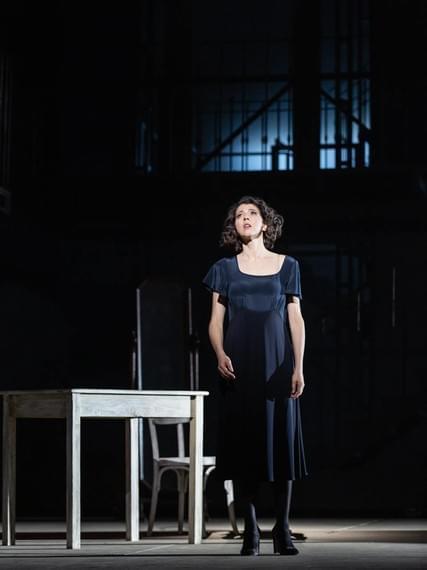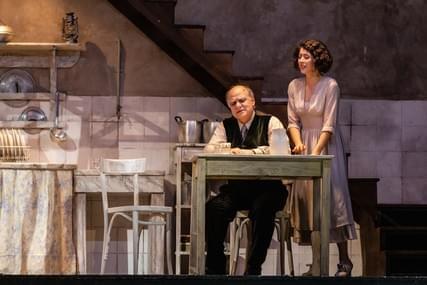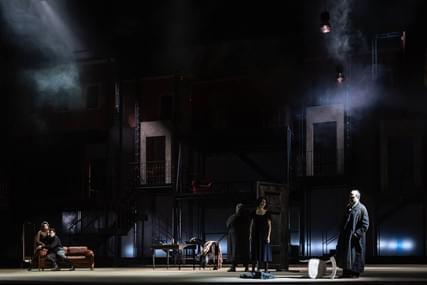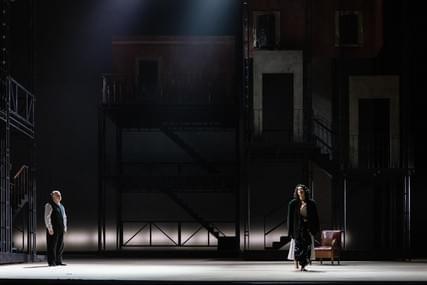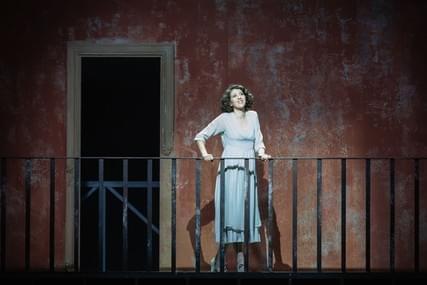Cast
| Rigoletto | Roberto Frontali | |
| Gilda | Lisette Oropesa | |
| Duke of Mantua | Ismael Jordi | |
| Sparafucile | Riccardo Zanellato | |
| Maddalena | Alisa Kolosova | |
| Giovanna | Irida Dragoti | |
| Count Monterone | Carlo Cigni | |
| Marullo | Alessio Verna | |
| Borsa | Saverio Fiore | |
| Countess Ceprano | Nicole Brandolino |
Conductor
Daniele Gatti
Stefano Ranzani
DirectorDaniele Abbado
ChorusmasterRoberto Gabbiani
LightingGianni Carluccio
CostumesFrancesca Sartori
CostumesElisabetta Antico
ChoreographySimona Bucci
About
New Production:
Rigoletto at the Opera di Roma.
The opening night performance (Dec 2) will be broadcast on RAI3
Media
Rigoletto - Opera di Roma

Tutti Magazine - Interview
Lisette Oropesa interviewed in Tutti Magazine

Il Messaggero, Da Lucia a Gilda, un anno da maratoneta
Lisette is profiled in the Il Messaggero newspaper for her "marathon" year.

Opera Wire - 11 Singers who had a year to remember
OperaWire gives Lisette the #1 position on singers who had a year to remember for 2018!

La Barcaccia - 30 Years
Lisette celebrates 30 years of the La Barcaccia radio program in Rome

Oper Magazin - Feature
Lisette Oropesa is featured on the cover of Oper Magazin

🍂 Fall Newsletter
Les Huguenots, L'elisir D'amore, Rigoletto
Reviews
OPERA/ “Rigoletto” e le camicie nere
Purissima l’emissione di Lisette Oropesa, una Gilda che ha letteralmente incantato il pubblico.The purity of Lisette Oropesa's performance as Gilda literally enchanted the audience.— Giuseppe Pennisi • Il Sussidiario
Il «Rigoletto» di Gatti è un Verdi doc
A questo punto, se Rigoletto smette di essere una palestra dove misurare atletismi e «canne» vocali, i cantanti devono essere valutati per quanto e come contribuiscano a un progetto interpretativo così rivoluzionario. In questo senso è perfetta la Gilda di Lisette Oropesa, che non solo canta benissimo sempre, ma riesce a trasformare «Caro nome» da grande aria della diva in un bellissimo, toccante soliloquio di una ragazzina innamorata.At this point, if Rigoletto ceases to be a gym where athletic prowess and vocal "pipes" are measured, singers must be evaluated for how much and how they contribute to such a revolutionary interpretative project. In this sense, Lisette Oropesa's Gilda is perfect, who not only always sings superbly, but manages to transform "Caro nome" from a great diva’s aria into a beautiful, touching soliloquy of a girl in love.— Alberto Mattioli • La Stampa
Rigoletto all’Opera di Roma: solitudine, dramma e segretezza
La soprano americana Lisette Oropesa è stata una Gilda dolce, innamorata ma decisa (giusto la cadenza del Caro Nome non è stata perfettissima, ma era una macchiolina su di una tovaglia bianca).The American soprano Lisette Oropesa was a sweet, lovestruck but determined Gilda (just the cadenza of Caro Nome was not absolutely perfect, but it was a tiny spot on a white tablecloth).— Marco Rossi • Cultura Mente
Roma, Teatro dell’Opera – Rigoletto
Il soprano Lisette Oropesa, in possesso di una vocalità tornita e di bello smalto, dipinge una Gilda fresca e liliale senza, però, scadere in vacui bamboleggiamenti o inutili atteggiamenti languorosi: la sua è sì una fanciulla innamorata ma, al contempo, risoluta e determinata. Piace qui ricordare la resa del “Caro nome”, dove la Oropesa esibisce pregevoli colorature, una buona tenuta dei fiati e un registro acuto di bellezza adamantina.The soprano, Lisette Oropesa, gifted with a well-rounded vocal ability and beautiful enamel, paints a fresh and lily-like Gilda, without, however, falling into empty gesticulations or useless languorous attitudes: her character is indeed a young woman in love, but at the same time, resolved and determined. It is pleasing to recall her rendition of "Caro nome", where Oropesa showcases admirable coloratura, a good maintenance of breath, and a high register of adamantine beauty.— Stefano Balbiani • Conessi all'Opera
Rigoletto fresco d’inchiostro
La voce di Lisette Oropesa ha quel tanto di ingenuo ma inossidabile nel carattere volitivo femminile, come nella tenuta d’intonazione e nella rotondità del registro acuto, che, quasi senza che ce ne accorgiamo, la bambina-Gilda cantando diventa donna prima del tempo. Non solo perché cinguetta un po’ meno ma perché l’orchestra la sollecita a far capire che la domenica andando alla messa forse aveva riflettuto anche sul suo futuro di orfana reclusa, in età di sentimenti non solo rispettosamente (rassegnatamente) filiali. E così, quando il suo canto-dolore domina il quartetto, viene soltanto da chiedersi come mai non avvenga sempre così.Lisette Oropesa's voice has that hint of naivety but indestructible in the feminine volitional character, as in the maintenance of intonation and in the roundness of the high register, which, almost without us realizing it, the child-Gilda singing becomes a woman before her time. Not only because she chirps a little less but because the orchestra urges her to understand that on Sunday going to mass she might have also thought about her future as a sequestered orphan, not only respectfully (resignedly) filial in an emotional sense. And so, when her song-of-pain dominates the quartet, one can only wonder why it doesn't happen like this all the time.— Angelo Foletto • Classic Voice
Cuore e batticuore nel Rigoletto di Gatti
Inquietante come inquietante è la risolutezza che Lisette Oropesa, grazie a un canto impeccabile e a una voce che conquista da subito, offre a Gilda : il suo Caro nome (con la cadenza originale scritta da Verdi) è una riflessione sull’amore, il Tutte le feste al tempio diventa la dichiarazione di libertà di una donna che, pur tradita, vuole comunque amare e andare fino in fondo al suo destino. Inquietante perché il suo cuore, nel buio, schiacciato da questo dolore più che piagato dal pugnale, smetterà di battere.Eerie, as eerie is the resolve that Lisette Oropesa, through impeccable singing and a voice that captures from the start, lends to Gilda: her "Caro nome" (with the original cadenza written by Verdi) is a reflection on love, the "Tutte le feste al tempio" becomes the declaration of freedom of a woman who, even when betrayed, still wants to love and follow her destiny to the end. Eerie because her heart, in the darkness, crushed by this sorrow rather than wounded by the dagger, will cease to beat.— Pierachille Dolfini • Pierachille Dolfini
“RIGOLETTO” INAUGURA LA NUOVA STAGIONE DEL TEATRO DELL’OPERA DI ROMA
Intensa pure la Gilda di Lisette Oropesa che ha saputo esprimere il candore e la purezza della virtù con un timbro morbido e assai gradevole, spostando l’interpretazione più sul piano lirico del fraseggio che non su quello della coloratura virtuosistica, probabilmente seguendo le indicazioni del direttore.Lisette Oropesa's portrayal of Gilda was also intense, as she was able to express innocence and the purity of virtue with a soft and very pleasing tone, shifting the interpretation more towards the lyrical phrasing rather than virtuosic coloratura, likely following the conductor's indications.— Francesco Giudiceandrea • GB Opera Magazine
Le 120 giornate di Rigoletto
Lisette Oropesa… vale tanto oro quanto pesa. Il soprano americano di origine cubana è una Gilda fresca e ingenua come dev’essere il personaggio, la sua voce è perfettamente adatta alla parte, con la coloratura agile e precisa, come ben si apprezza in Caro nome e in Tutte le feste al tempio.Lisette Oropesa... is worth her weight in gold. The American soprano of Cuban origin is a fresh and innocent Gilda, just as the character should be, her voice is perfectly suited to the role, her coloratura is agile and precise, as is appreciated well in "Caro nome" and "Tutte le feste al tempio."— Nicola Iannello • L'ascoltatore dilettante
Rigoletto à Rome : retour à Verdi
Lisette Oropesa est en train de devenir l’une des références parmi les sopranos, elle a triomphé à Paris dans Les Huguenots, puis dans Don Pasquale, elle fut avec Gatti Nanetta dans le Falstaff d’Amsterdam. On pourrait croire en une voix légère, mais il n’en est rien, la voix a un vrai corps, avec des aigus et suraigus très maîtrisés et très contrôlés. Elle est une Gilda très fraîche, jeune, mais aussi décidée et mûre. Elle n’a rien d’un rossignol, notamment dans le célèbre « Caro nome » débarrassé des cadences et fioritures inutiles, tout au contraire : la ligne de chant et les passages sont impeccables, la diction sans aucun accroc, avec un vrai sens de la couleur, elle sait notamment faire émerger le drame, les hésitations, tout autant que la joie : la manière dont à son entrée en scène elle se précipite vers son père pour essayer de lui raconter son amour naissant (sans y réussir d’ailleurs) avec une couleur juvénile et dans la sincérité immédiate de la joie, tranche avec un « Caro nome » certes plein d’amour, mais déjà sérieux, presque mélancolique qui est un chef d’œuvre de retenue et d’émotion notamment dans le « e fin l’ultimo mio sospir, caro nome, tuo sarà. » si prémonitoire.Elle sait aussi à la fin du second acte, avoir des accents dramatiques marqués. La voix est d’une rare sûreté, d'une grande homogénéité et l’engagement est total. Une très grande Gilda, sans doute la meilleure aujourd’hui, qui sait parfaitement doser l’engagement entre la jeunesse, l’amour, le drame, avec une grande présence scénique et vocale : elle est bouleversante dans la scène finale (« Ah, ch’io taccia ! A me, a lui perdonate. ») où comme au final du II, elle demande au père de pardonner (« Perdonate : a noi pure una voce di perdono dal cielo verrà. »), une fois de plus prémonitoire, puisque la mise en scène la fait mourir debout, telle l’ange qu’elle deviendra au ciel…Lisette Oropesa is becoming one of the reference points among sopranos; she triumphed in Paris with Les Huguenots, followed by Don Pasquale, and was with Gatti as Nanetta in Amsterdam's Falstaff. One might expect her to have a light voice, but this is not the case. Her voice has a real body, with very controlled and masterful high notes and upper registers. She is a very fresh, young, but also determined and mature Gilda. She is nothing like a nightingale, especially in the famous "Caro nome" stripped of unnecessary cadenzas and embellishments, on the contrary: the vocal line and passages are impeccable, the diction flawless, with a true sense of color. She knows how to bring out drama, hesitations, and joy alike: the way she rushes towards her father trying to tell him about her budding love (without managing to, by the way) with a juvenile color and in the immediate sincerity of joy, contrasts with a "Caro nome" full of love, but already serious, almost melancholic, which is a masterpiece of restraint and emotion, particularly in the premonitory "e fin l'ultimo mio sospir, caro nome, tuo sarà." She also knows how to bring out dramatic accents marked at the end of the second act. The voice is of rare reliability, with great homogeneity, and her commitment is absolute. A very great Gilda, probably the best today, who knows perfectly how to balance commitment between youth, love, drama, with a great stage and vocal presence: she is heartrending in the final scene ("Ah, ch'io taccia! A me, a lui perdonate.") where, as at the end of Act II, she asks the father for forgiveness ("Perdonate: a noi pure una voce di perdono dal cielo verrà."), once again premonitory, since the staging has her die standing, like the angel she will become in heaven…— Guy Cherqui • Wanderer
Performance History
Lisette has given 73 performances as Gilda.
2025
Arena di Verona
LA Opera2022
Metropolitan Opera
Wiener Staatsoper2021
Royal Opera House2018
Arena di Verona
LA Opera2017
Opéra National de Paris
De Nationale Opera2016
Teatro dell'Opera di Roma2015
Teatro Real
Bayerische Staatsoper
Het Concertgebouw2014
Grand Théâtre de Genève2013
Metropolitan Opera2008
Arizona Opera
New Orleans Opera




